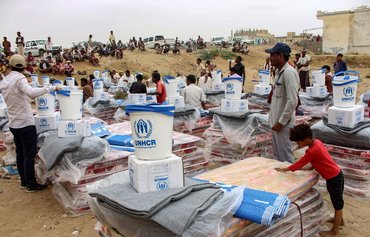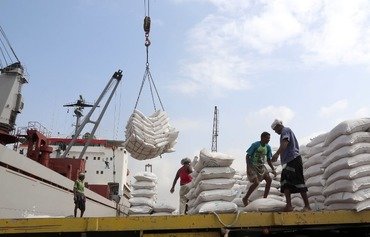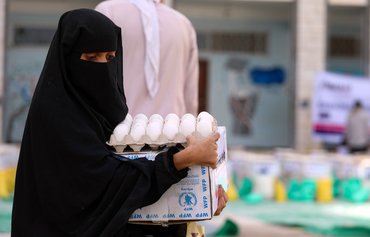The Houthis' interference in the work of international organisations in Yemen is part of the reason why donor funding has dropped, Yemeni officials said.
The Iran-backed militia (Ansarallah) has tampered with the delivery of aid, looted aid intended for civilians, and pressured international organisations to hire the staff it selects, they said.
This has made donors reluctant to respond to appeals for funding, they added, pointing out that as a result of the Houthis' actions, Yemenis in areas they control will be deprived of key aid and services.
The UN said August 19th it had been forced to close or severely cut back half of its major programmes in Yemen.
"We have a moral obligation to warn the world that millions of Yemenis will suffer and could die because we do not have the funding we need to keep going," said the UN humanitarian co-ordinator for Yemen, Lise Grande.
A Yemen aid conference held in Riyadh on June 2nd saw donors pledge only $1.35 billion of the $2.41 billion needed to cover essential humanitarian activities until the end of the year, leaving a gap of more than $1 billion.
Impact of funding gap
The UN said the impact of underfunding had been dramatic.
In April, food rations for more than eight million people in northern Yemen were halved and humanitarian agencies were forced to stop reproductive health services in 140 facilities.
Health services were cut or reduced in a further 275 specialised centres for treating people with cholera and other infectious diseases.
Allowances to nearly 10,000 frontline health workers were stopped and the supplies needed to treat trauma patients, who will almost certainly die without immediate treatment, were halted.
Without urgent funding, medicines and essential supplies for 189 hospitals and 2,500 clinics -- half of the health facilities in Yemen -- will halt work within weeks.
International medical charity Doctors Without Borders (MSF) has warned that Yemen faces a "catastrophe" from the novel coronavirus.
The UN says COVID-19 has likely already spread throughout most of Yemen, even though less than 2,000 cases, including 537 deaths, have been recorded. Meanwhile, Yemeni officials have accused the Houthis of lying about the gravity of the outbreak in areas they control.
Obstruction of aid
On World Humanitarian Day, August 19th, Deputy Minister of Health Abdul Raqeeb al-Haidari called on the international community to condemn the Houthis' violations against humanitarian workers and their obstruction of aid.
The Houthis in April attempted to coerce the World Food Programme into delivering cash aid to them, in a move widely dismissed as "cheap blackmail".
In July, the militia attempted to bargain with humanitarian organisations operating in areas under its control, giving them a choice between employing Houthi-affiliated workers or having their work suspended or obstructed.
In a July 29th document published by local media, the Houthis demanded that international organisations hire its elements in several core areas, including health, water, administrative and financial initiatives and project management.
"International organisations tried to avoid mentioning the Houthis' violations and their looting and theft of aid until they reached an intolerable level, as was the case with the WFP," said Deputy Minister of Human Rights Nabil Abdul Hafeez.
Through their actions, he told Al-Mashareq, the Houthis reduced international assistance to needy communities, and prevented them from receiving help.
Undermining relief efforts
"The port of al-Hodeidah receives 80% of the aid provided by international organisations for residents living in Houthi-controlled provinces," economist Abdul Aziz Thabet told Al-Mashareq.
This gives the Houthis influence and control over how the aid is allocated, both directly through employees affiliated with the militia, and indirectly through local civil society organisations that partner with international organisations, he said.
The local organisations "operate under the [Houthis'] supervision and control the distribution of aid and selection of targeted beneficiaries", he added.
"International relief organisations have indeed contributed to alleviating the human suffering of Yemenis as a result of the war," Thabet said. But the Houthis' "interference in the organisations' work has undermined their efforts".

![Yemeni children walk past tents at a displacement camp in the Khokha district of al-Hodeidah on May 6th. [Khaled Ziad/AFP]](/cnmi_am/images/2020/09/07/25867-Yemen-Hodeidah-children-600_384.jpg)






